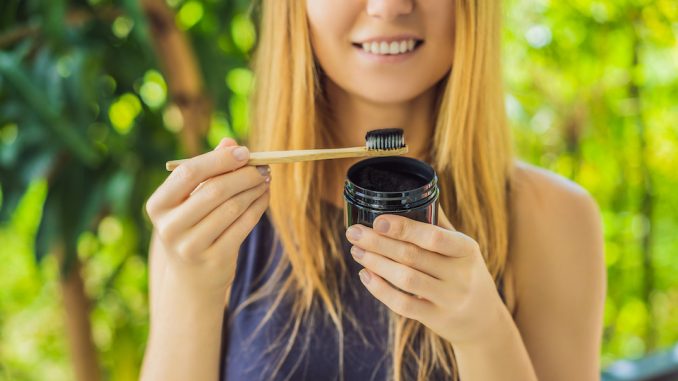
While most of us stick with brushing twice a day (and hopefully regular flossing too), there are more and more reasons to seek out an alternative oral health routine. Conventional toothpaste contains questionable ingredients like fluoride and SLS; mouthwash dries out our gums and kills beneficial bacteria with alcohol and chlorhexidine, and regular toothbrushes are another source of plastic that is clogging up our landfills and our oceans. If you’ve ever wondered about other options for keeping your teeth and gums happy and healthy, here are eight surprising alternative oral health habits that are supported by science.
Treat your mouth to some yummy honey
Honey has been used since ancient times and, more recently, for the healing of wounds and against infectious diseases. Scientific studies show that Manuka honey, in particular, has real benefits for oral health, and despite its high natural sugar content, behaves in very different ways than refined sugar.
Research shows that high-quality Manuka honey can halt bacterial growth that is associated with plaque, tooth decay, and gum disease. Honey is not like sugar that creates an acidic and demineralizing environment. Manuka honey stacks up against pharmaceutical antibacterials, showing equal effectiveness at fighting plaque formation compared to the antibacterial mouthwash chlorhexidine.
Furthermore, Manuka honey packs powerful anti-inflammatory and healing properties. To reduce inflammation on your gums, simply rub on some Manuka. You don’t have to suffer from gum disease to benefit from using Manuka, as it keeps bacteria from building up around the gums.
Brush with turmeric
Turmeric is a powerful anti-inflammatory and great for overall oral health and in fighting gum disease. It has been used in eastern cultures for centuries, and studies have now investigated its ability to relieve gum disease, heal oral wounds, and treat precancerous lesions in the mouth. Anecdotal evidence also suggests turmeric may be able to whiten teeth. How to brush your teeth with turmeric? Pour a little turmeric powder in a small bowl. Wet your toothbrush and dip it into the powder. Brush your teeth as usual and let the powder sit on your teeth and in your mouth for two minutes, then rinse.
Swish with coconut oil
Stemming from a traditional Indian practice called Ayurvedic medicine, oil pulling is the process of swishing oil in your mouth to remove plaque and bacteria and improve oral health.
Although skeptics often dismiss this practice, recent studies have examined the effectiveness of coconut oil pulling compared to traditional treatments like chlorhexidine mouthwash. Coconut oil pulling has been shown to inhibit the adhesion of plaque to teeth and oral surfaces, and decrease levels of harmful microbes, thereby preventing halitosis and gingivitis. To try oil pulling, simply take a tablespoon of coconut oil, place it in your mouth, let it melt, and swish it around your teeth and gums for several minutes. Aim to continue for at least 10 to 15 minutes, then spit the used oil into the garbage before brushing your teeth.
Spread activated charcoal
While filling your mouth with a black substance may seem counterintuitive when you are aiming for healthier, whiter teeth – activated charcoal has become a major oral health trend. The fine black powder has natural absorbing properties that can remove toxins from your body and remove surface stains from teeth to naturally whiten your smile. Try rubbing a pinch all over your teeth with your finger for a few minutes a couple of times a week. You should see results after two to four weeks.
Rinse with saltwater
A simple saltwater rinse is a cost-effective method to boost oral health that you can do right at home. A saltwater rinse can help fight off gingivitis, bad breath, and even a sore throat. Additionally, rinsing with salt can help wounds inside the mouth heal faster and is a good technique to practice after oral surgery to speed recovery. It works because it creates an isotonic environment in your mouth in which bacteria struggle to survive, effectively disinfecting your mouth as you swish it around. Just mix a half-teaspoon of sea salt or pink salt into a little warm water and swish for at least 30 seconds, then rinse.
Chew carrots and celery
Munching on carrots massages gums and acts as a natural toothbrush. Carrots also contain vitamin A, which is essential for strengthening tooth enamel. As you munch, you also produce saliva that neutralizes bacteria. Celery is also a good choice for a plaque-removing snack.
Eat seeds
Have you ever noticed that Indian restaurants often have a small bowl of colorful seeds displayed near the cash register? Chewing digestive spices and seeds called mukhwas after a meal is an ancient Indian tradition. This special blend can help digestion and freshen your mouth. The main ingredients in this seed combo are fennel seeds, cumin seeds, anise seeds, sesame seeds, and coconut.
Don’t forget your tongue
We all brush our teeth, but what about your tongue? Turns out, the bumps and crevices on your tongue can hide bacteria and debris that can contribute to tooth decay and bad breath. Removing bacteria is essential to prevent gum disease and other oral conditions. Tongue scraping can help improve your oral health, starting with your tongue. You can purchase a tongue-cleaning device from your local drugstore or health food store.
Why not try introducing a few of these unusual techniques into your oral care regimen to help keep your breath fresh and teeth white. In the meantime, keep smiling!
Via Up Wellness
